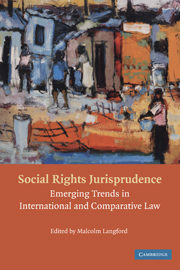Book contents
- Frontmatter
- Contents
- Foreword – Philip Alston
- Preface
- PART ONE OVERVIEW
- PART TWO SELECT NATIONAL JURISDICTIONS
- 4 South Africa
- 5 India
- 6 South Asia
- 7 Colombia
- 8 Argentina
- 9 Brazil
- 10 Venezuela
- 11 Canada
- 12 The United States
- 13 Hungary
- 14 France
- 15 United Kingdom
- 16 Ireland
- PART THREE REGIONAL PROCEDURES AND JURISPRUDENCE
- PART FOUR INTERNATIONAL HUMAN RIGHTS PROCEDURES AND JURISPRUDENCE
- PART FIVE SPECIAL TOPICS
- Notes on Contributors
- Table of Authorities
- Index
- References
15 - United Kingdom
Asserting Social Rights in a Multi-layered System
Published online by Cambridge University Press: 05 June 2012
- Frontmatter
- Contents
- Foreword – Philip Alston
- Preface
- PART ONE OVERVIEW
- PART TWO SELECT NATIONAL JURISDICTIONS
- 4 South Africa
- 5 India
- 6 South Asia
- 7 Colombia
- 8 Argentina
- 9 Brazil
- 10 Venezuela
- 11 Canada
- 12 The United States
- 13 Hungary
- 14 France
- 15 United Kingdom
- 16 Ireland
- PART THREE REGIONAL PROCEDURES AND JURISPRUDENCE
- PART FOUR INTERNATIONAL HUMAN RIGHTS PROCEDURES AND JURISPRUDENCE
- PART FIVE SPECIAL TOPICS
- Notes on Contributors
- Table of Authorities
- Index
- References
Summary
INTRODUCTION
The United Kingdom's constitution is for the most part unwritten. Early protections of rights, such as the Magna Carta 1215 and 1297, and the Bill of Rights 1689, were assertions of the power of barons and later Parliament against the overreaching monarchy, yet were not entirely without benefit to the common person. Human rights were also given some but rather limited protection under the common law. The infringement of certain liberty or property interests has for some time given rise to a principle of statutory interpretation whereby ambiguities were construed against the government. To a more limited extent, courts would on occasion take notice of international human rights law when required to interpret ambiguous statutory terms.
Against such a background, the adoption of the Human Rights Act 1998 (‘HRA 1998’) was a watershed in the United Kingdom's constitutional history. Coming into force in 2000, the Act led to a profound shift in the role of the judiciary as a guardian of rights. However, it would be wrong to think that the HRA 1998 provides the departure point for the United Kingdom on the judicial protection of social welfare rights. Judicial controls on the abuse of power and protection of statutory entitlements in the welfare state were developed largely in the context of administrative law, and also to a great degree through the proliferation of statutory tribunals and non-adjudicative complaints mechanisms.
- Type
- Chapter
- Information
- Social Rights JurisprudenceEmerging Trends in International and Comparative Law, pp. 276 - 294Publisher: Cambridge University PressPrint publication year: 2009



